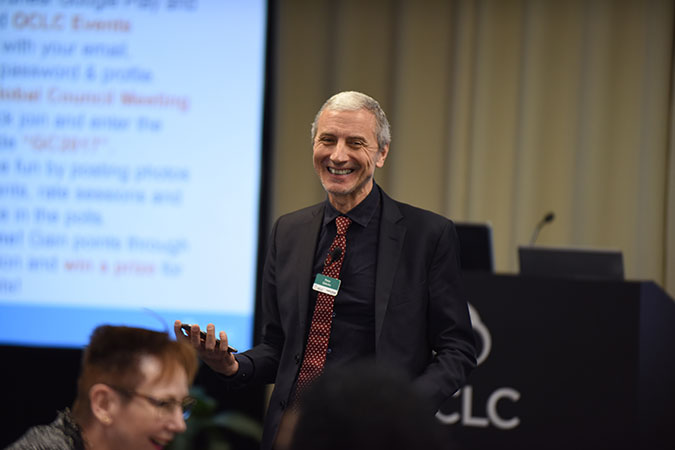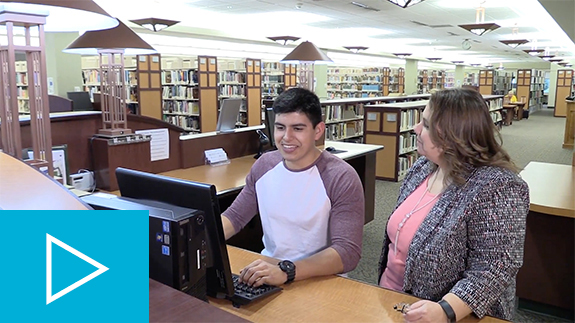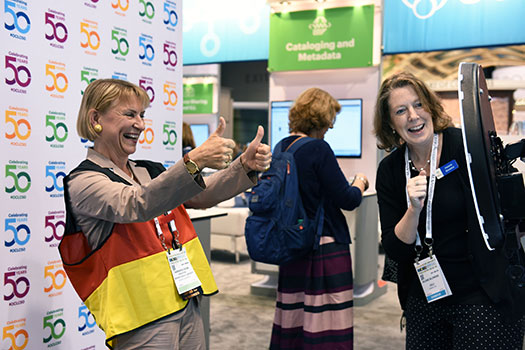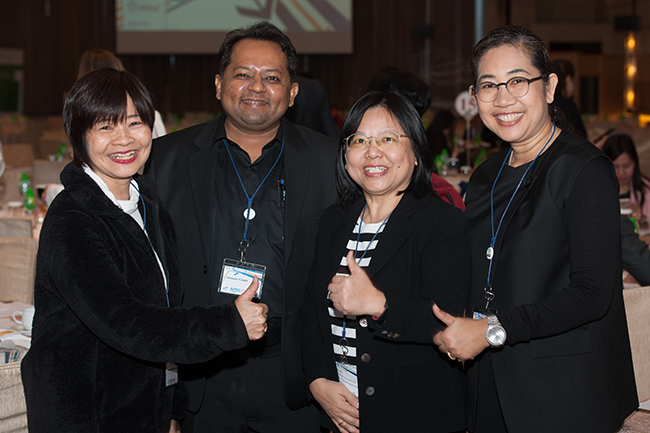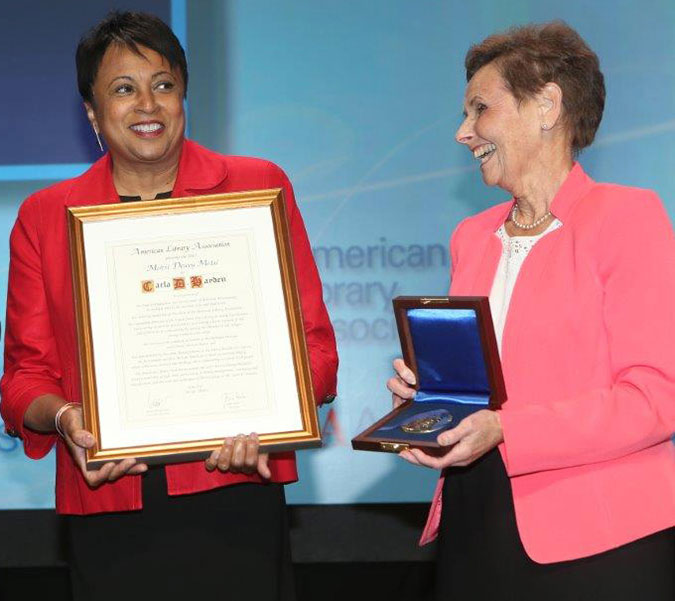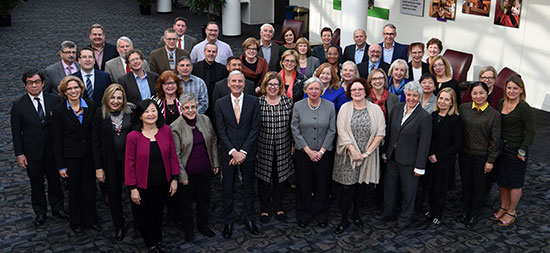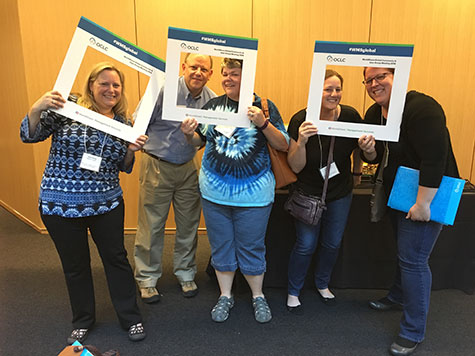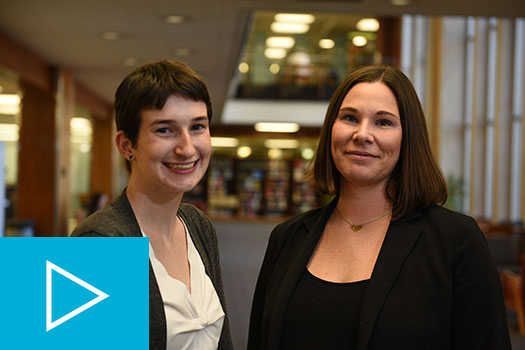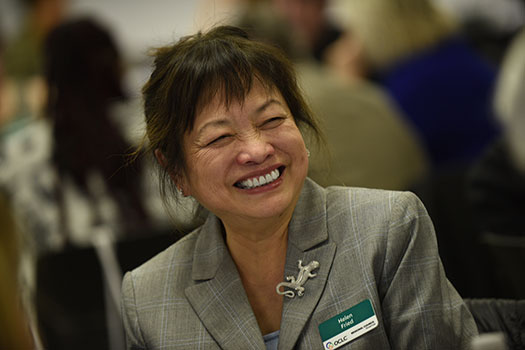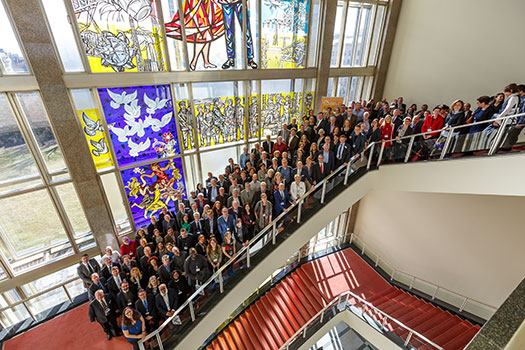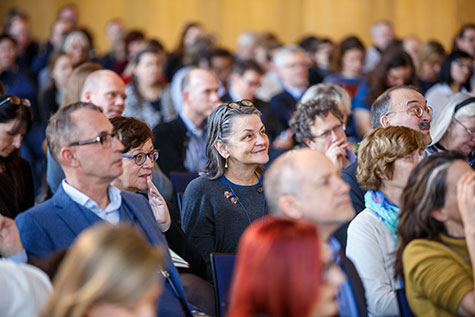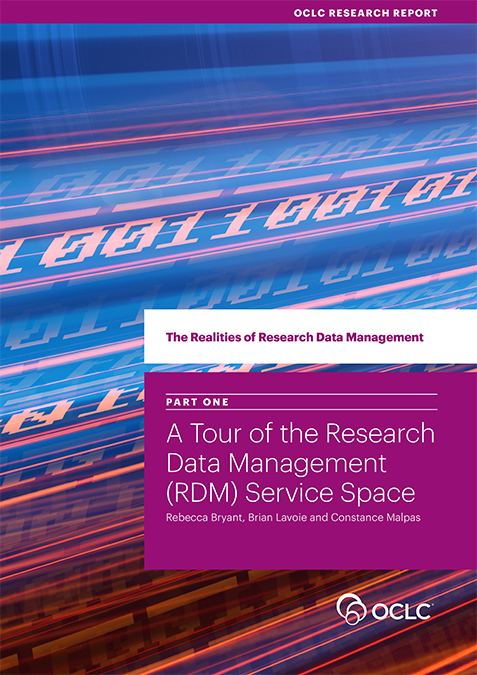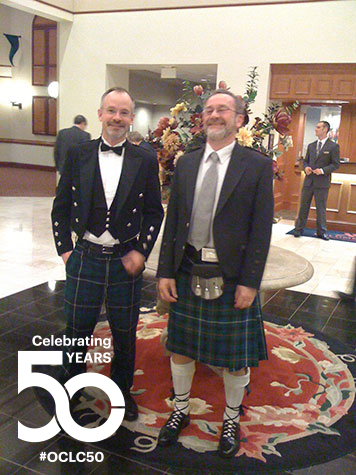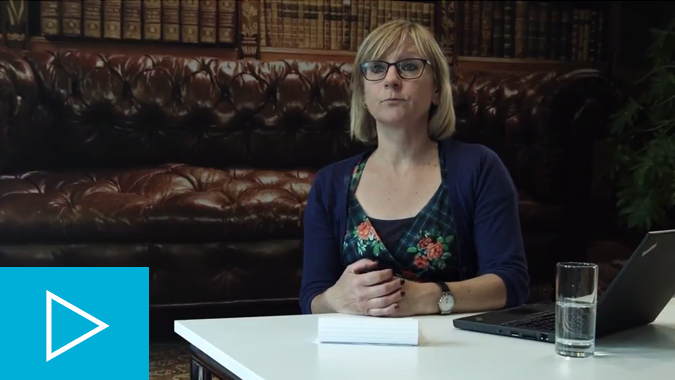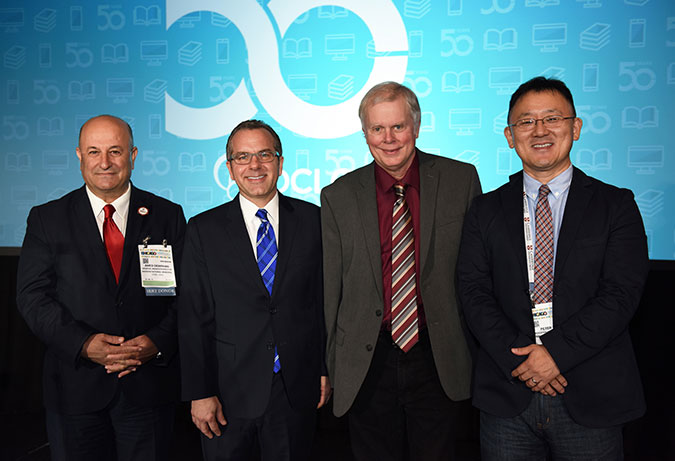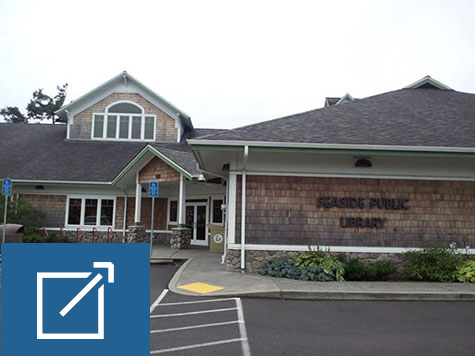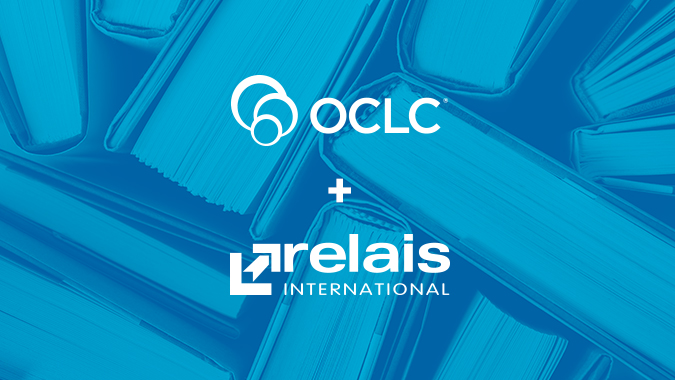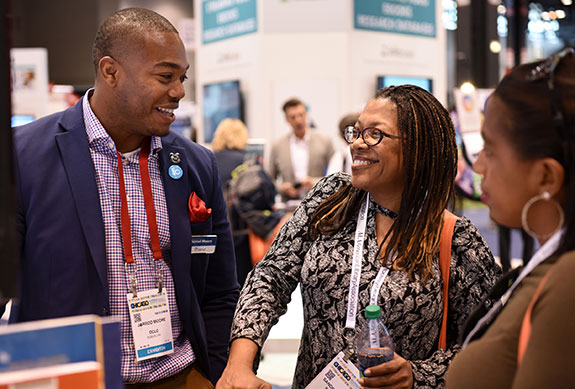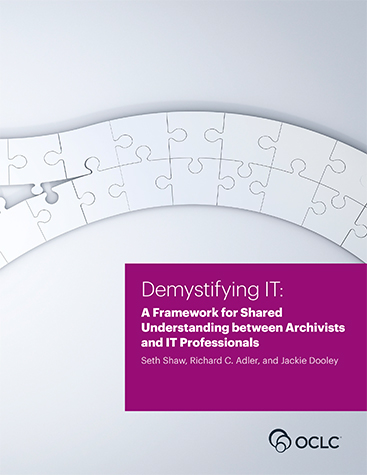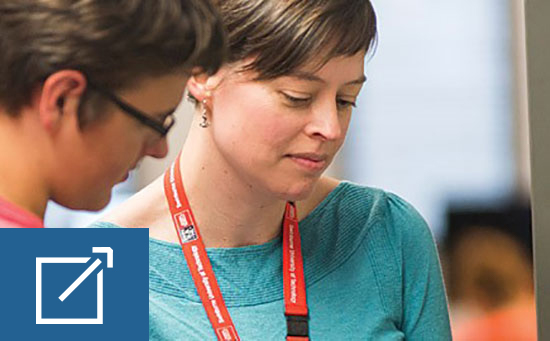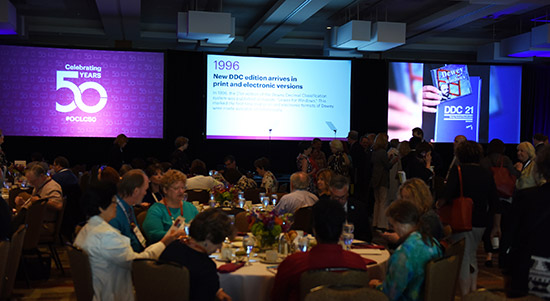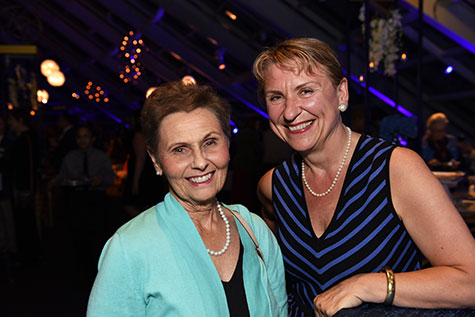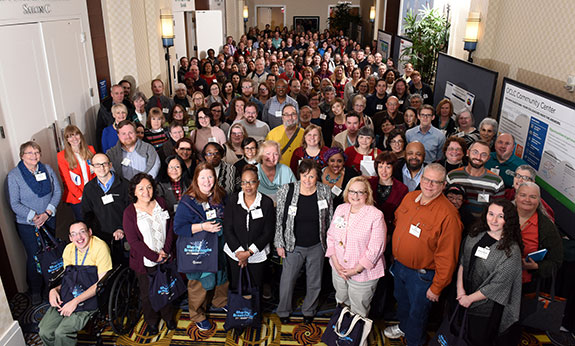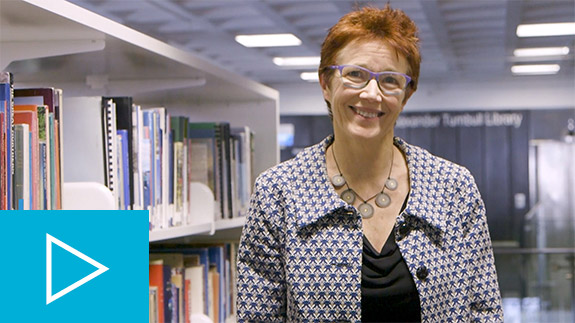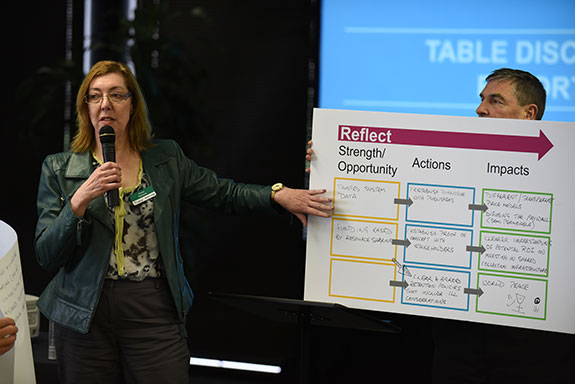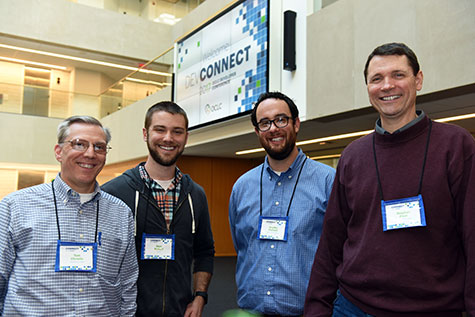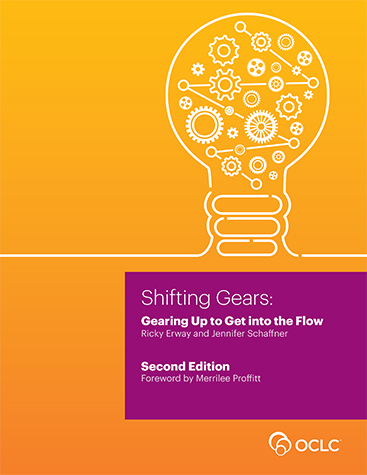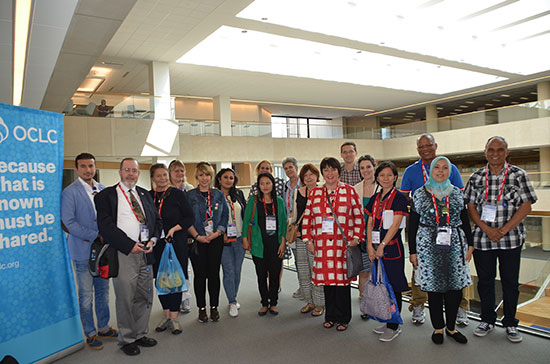continual
reinvention
50 years of successfully
navigating change

Dear colleagues:
OCLC is a rare example in the technology world of both continuity and reinvention. What started in 1967 as a dream for a few academic libraries in Ohio is now a reality for thousands of libraries worldwide and the millions of people we serve.
In celebrating our golden anniversary, we had a chance to reflect on OCLC's 50-year commitment to shared technology, research, and community, including examples of reinvention from the past year. In FY17, we reimagined the use of WorldShare® for student workers. We rethought resource sharing to expand both what can be done and for whom. We engaged in major new research that points toward the need to reinvent library collaboration at even greater scales. You can read more about these and other efforts below.
OCLC has made giant strides in the past 50 years. We have great plans for the future, too, starting in FY18 with a reinvention of the collective collection. We're launching a global theme of The Smarter Library for all of our regional council meetings. And we're finding new ways to make more of our services available for an even wider array of libraries. And that's just to name a few key initiatives.
We are also stewards of our members' contributions. As a nonprofit organization, our goal is not to make money for investors or owners. We instead work to make a difference for our members, as we work to make knowledge more accessible to all. Our financial results are one metric of those efforts. I hope you'll take a few minutes to review our accomplishments below and the associated financial results.
Thank you for 50 wonderful years. Here's looking forward to the next half-century of making breakthroughs together.


Respectfully,

Skip Prichard
OCLC President and Chief Executive Officer
A Year in Review
Reinventing

WorldCat and WorldShare
At the core of our commitment to sharing are WorldShare and WorldCat®. We continue to add new types of data and new opportunities for cooperative workflows.


WorldShare Management Services (WMS) were enhanced with new features—more than 70% driven by member feedback.



The first-ever OCLC WMS Global Community & User Group Meeting was held in September 2016, in Dublin, Ohio, USA, bringing together more than 120 library professionals from four continents around the world.

The community using WMS continued to grow in FY17. Among the new subscribers were Library and Archives Canada; Münster University of Applied Sciences (Fachhochschule Münster), our first academic institution in Germany; and De La Salle-College of Saint Benilde, in Manila, the Philippines, the first library in Asia to select WMS.

WMS expanded its mobile capabilities with the introduction of the Digby™ app.


In FY17, we achieved system availability of 99.8% for WorldShare, and 99.9% for WorldCat.



We expanded WorldCat to:

RECORDS

HOLDINGS
We added more than 2,000 new collections from 150+ new providers to the WorldCat knowledge base.


There were more than 274 million page views on WorldCat.org™, making library collections findable and accessible around the world.
Reinventing

resource sharing
No single library can hold every item its users need. Our members rely on the OCLC resource sharing network locally, in groups, and around the world. In FY17, we made significant investments that make it even easier for more types of libraries and groups to support one another.



We launched Tipasa®, the first cloud-based interlibrary loan management system, in January 2017. At the end of FY17, 115 had committed to implementation.

The Relais™ International team joined OCLC in January 2017. Relais D2D, the market-leading consortial borrowing solution, provides key features such as requestability logic, which facilitates the highest fill rates in the industry.

We also announced a new shared print registration service to enable libraries to note their commitments to preserve unique content in shared print initiatives using WorldCat. This streamlined process of registering retention commitments will make data about shared collections available more quickly.



We helped your users quickly get the resources they needed.

INTERLIBRARY LOAN REQUESTS
were created, and every

A REQUEST WAS FILLED
by a library.
Our services allow for new resource sharing practices that reflect network-level commitments and resources.
Reinventing

research
In FY17, our research efforts were focused on areas where libraries interact at larger scales. That includes work between OCLC members, with other library groups, with regional and national infrastructures, and with other professions in the larger educational environment.


We conducted original research to explore the important trends that will impact libraries in the future:
Advancing the National Digital Platform identifies the extent to which public libraries are digitizing their collections and how they can work cooperatively.
We explored the realities of research data management within higher education, publishing the first in a four-part series, The Realities of Research Data Management.
With Demystifying IT, we helped archivists achieve a better understanding of how information technology professionals work so that they can be more effective collaborators.
Collective Wisdom: An Exploration of Library, Archives and Museum Cultures examined opportunities for collaboration across library, museum, and archive sectors.




We relaunched the “Distinguished Seminar Series” with an emphasis on equity and inclusion initiatives.

Our Research Library Partnership welcomed three new members, growing to 150 libraries in 14 countries.

Reinventing

community
We are constantly exploring new ways to connect with you, learn from you, and provide opportunities where you can learn from your colleagues, peers, and OCLC staff. FY17 saw both innovation and growth in our membership activities.



More than 15,000 learners used the WebJunction Catalog of library courses and webinars during the year.

We launched the Wikipedia + Libraries: Better Together project, a training program that strengthens ties between US public libraries and Wikipedia to expand public access to authoritative content.

The IFLA Congress took place in Columbus, Ohio, USA, and we hosted 1,100 delegates throughout the event, including OCLC campus tours at our newly remodeled headquarters building.




And more than 1,100 librarians from more than 500 libraries attended our series of 13 OCLC Member Forums, including Forums in the UK and Puerto Rico.

The OCLC Community Center grew to more than:

MEMBERS
from more than

INSTITUTIONS
We expanded opportunities for member connections through the addition of three new product communities: WorldShare Analytics, Tipasa, and ILLiad to Tipasa.

The inaugural OCLC Resource Sharing Conference enabled nearly 350 resource sharing librarians to share best practices through presentations and panel discussions.


In the Netherlands and Germany, we had our highest attendance yet at Contact Day and Bibliotheksleitertag with a combined total of 545 guests.
Reinventing

regional infrastructure
As we reviewed our 50-year history, we saw WorldCat became the de facto national catalog for the US in the 1980s. Because of that, other countries and groups accelerated their contributions to WorldCat, making it an essential global hub for library metadata.




To realize even greater efficiencies, the UKB, a Dutch library consortium representing all of the nation's academic libraries, is now using the WorldShare Platform to share metadata, applications, and innovations, enabling collaboration at national and global levels.


We continued to add many national catalogs, unique local collections, and important academic resources, including original records from the National Central Library of Rome, the Bibliothèque et Archives nationales du Québec, and the National Library of Korea.



We entered into a new collaborative partnership with Jisc in the UK to build a National Bibliographic Knowledgebase.


We completed two phases of work with the New Zealand Te Puna service, a national library partnership that serves 92% of libraries in New Zealand.


We completed the Unicode project.

LANGUAGES

Unicode support enables our libraries to upload, catalog, and discover titles using every character of every script in the world.


Thank you to our members, partners, and staff for everything we accomplished last year. From new products and services to increased data quality, from research reports to community engagement—your enthusiasm, efforts, and ideas are what keep moving our cooperative forward.
A Year in Pictures
A Year in Financials
Ensuring a strong future
As a nonprofit global library corporation, our goal is to achieve an operating income over time that ranges between 2% and 4% of revenues. This approach ensures that OCLC remains financially sound and can make ongoing investments in technology, research, and development required to meet the needs of our membership. Historically, we have achieved this goal through revenues in line with the cost to deliver services, plus interest and dividend income from our investment portfolio.
As noted in last year's report, OCLC has operated at a loss due to restrained price increases combined with heavy strategic investment into new services, as well as technology upgrades, facility renovations, and a staff resource realignment. Dividend and interest income from the investment portfolio has enabled OCLC to partially offset these operating losses. (See Operating results before portfolio activity in the Summary of consolidated activities table below).
Unlike other library services organizations, we reinvest all of our income into new products and programs rather than distributing funds to shareholders or business owners. Our revenue stream from library services and the investment portfolio provide a stable cash flow that allows for strategic capital investments while supporting the long-term viability of OCLC.
Summary of consolidated activities
Amount in $ millions
| FY17 | FY16 | ||
|---|---|---|---|
| Operating Activities |
Library service revenues | $208.4 | $203.4 |
| Operating results before portfolio activity | ($6.7) | ($10.0) | |
| Investing Activities |
Investment portfolio activity | ||
| Dividends and interest income | $7.0 | $7.2 | |
| Net gains/(losses) | ($3.3) | $0.2 | |
| Net contribution | ($3.0) | ($2.6) |
OCLC's revenues from library services in FY17 increased by $5 million over the prior year as more than 450 libraries worldwide are now using WorldShare Management Services. The upward trend in revenues was also guided by new product introductions (both internally developed and through acquisition), such as Tipasa, our cloud-based interlibrary loan management system, and the acquisition of Relais D2D (Discovery to Delivery), a market leader in consortial borrowing. These innovations, combined with ongoing developments in our management, metadata, and end-user service lines, are anticipated to continue to grow revenues over the next several years.
Although OCLC's operating results in FY17 reported a loss before portfolio activity, our financial results improved significantly from the previous year, reflecting the impact of higher revenues, completion of facility renovations, and major technology projects, as well as our ongoing efforts to minimize general and administrative cost increases. These ongoing product development and infrastructure investments are expected to support continued revenue growth in core library services, enabling OCLC to gradually eliminate our operating losses and return to historical operating income targets of 2–4% of revenues.
Net contribution for FY17 after portfolio activity was a loss of $3.0 million. Although consistent with the prior year, the loss was primarily due to a restructuring of our portfolio investments in accordance with OCLC's investment policy.
Report of the Audit Committee
The Audit Committee, consisting entirely of independent trustees, assists the Board of Trustees in its oversight of our financial reporting process, and is responsible for, among other things, reviewing with BDO USA LLP, independent auditors, the scope and results of its audit engagement.
For additional information, please visit these online resources:
The OCLC investment portfolio
Our investment portfolio was valued at $234.1 million at the end of FY17, increasing from $228.0 million in the prior year. The portfolio increase resulted from performance in the overall market.
The investment portfolio includes OCLC's Sustainability Fund and $16.6 million in advance subscription payments. The Sustainability Fund is managed similar to an endowment and supports OCLC's continuity while providing financial flexibility and permitting us to focus on long-term objectives and commitments to our membership. The Sustainability Fund generates a stable source of dividend and interest income to fund operations and major capital spending projects and facilitates our ability to borrow at competitive interest rates.
At the end of FY17, OCLC's outstanding debt decreased to $79.0 million compared to $85.7 million last year related to scheduled principal and interest payments.
Investment portfolio & debt composition
Amount in $ millions end of fiscal year
Investing for our future
OCLC invests its resources to address requirements identified by the membership. This model allows us to invest in focused technology, research, and development to meet library needs well into the future. As shown in the chart below, we continued to invest in a variety of areas and specific initiatives that are critical to our member libraries (amount shown includes expensed research and development plus capitalized software development). During the past five years, these expenditures have exceeded $170 million.
FY17 research & development expenditures
Total $30.1 million
Investment categories include:
- Metadata services 14%OCLC Cataloging and Metadata Subscription, WorldShare Collection Manager, WorldShare Record Manager, Contract Cataloging, Dewey® Services, CBS
- Resource sharing services 13%Tipasa, Relais D2D, WorldShare Interlibrary Loan, VDX®, ILLiad, WorldCat Navigator
- End user services 4%WorldCat Discovery, WorldCat.org, QuestionPoint®, PiCarta®
- Management services 16%Sustainable Collection Services®, WorldShare Management Services, WorldShare License Manager, WorldShare Collection Evaluation, WorldShare Report Designer, CONTENTdm®, EZproxy®, SISIS-SunRise™, LBS, Amlib®, BIBLIOTHECAplus™, bicatWise, OLIB®
- Data services 8%WorldCat, WorldCat knowledge base
- WorldShare Platform 4%Support for cloud services
- OCLC Research 20%Research initiatives, Research Library Partnership
- Systems/corporate initiatives 21%Data centers, technical infrastructure


Thank you!
Our 50th anniversary allowed us a wonderful chance to share memories, stories, and breakthroughs with so many of you, all around the world. With your help, we'll keep the spirit of “continual reinvention” alive for many years to come. If you have questions or comments about this annual report, please send an email to [email protected].
For additional information, please visit:






